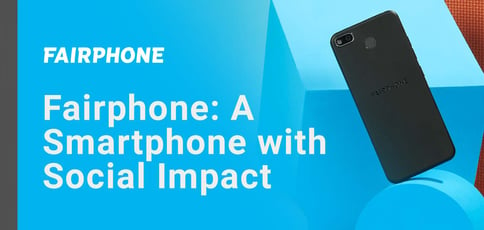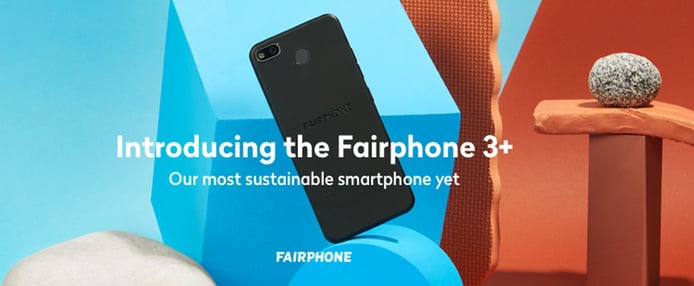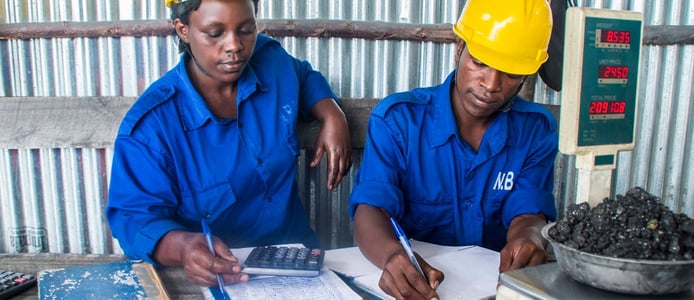
TL; DR: Fairphone advocates for industry responsibility by reimagining the development and life cycle of the smartphone. The Dutch social enterprise puts human well-being, device longevity, and environmental impact at the forefront as it designs, manufactures, and sells its sustainable devices. By joining the FairTEC collective, Fairphone will help provide options for ethical smartphone solutions to a broader audience eager to embrace environmental stewardship.
The tech industry, despite all of its promise in other areas, has an enormous impact on the environment.
In 2018, the nonprofit RESET estimated that digital technologies account for 3.7% of global carbon dioxide emissions — outranking the aviation industry’s 2.5% rate of emissions.
The hosting industry can’t deny its part in this destruction: We know the energy generation required to host streaming services, search engines, and websites is directly responsible for carbon dioxide emissions. That’s why many hosting companies are investing in carbon offset programs and renewable energy to reduce the industry’s carbon footprint.

Another step sustainably minded hosts (and their customers!) can take is recognizing that we really do have the world (and its fate) at our fingertips. Approximately 6.3 billion people across the globe have active smartphone subscriptions — and the average phone is replaced every two to three years.
It’s time for the tech industry at large to adopt ethical smartphone solutions from companies like Fairphone. The company designs its long-lasting devices with an eye toward human rights, the well-being of workers, and waste reduction.
“My favorite aspect of Fairphone is that it’s highly repairable and made up of modules,” said Miquel Ballester, Design Lead and Co-Founder of Fairphone. “We have been able to make Fairphone the only upgradeable phone, and we do this so that users can keep their devices working longer. We have even been able to upgrade its cameras.”
The result is a hardware product that hosts, small businesses, and individuals can all feel good about.
Born From an Awareness Campaign
Fairphone was founded in 2013 by Miquel, Bas van Abel, and Tessa Wernink. But its roots go back to September 2010, when the company’s founders started a petition against conflict minerals in consumer electronics. The mining sector, which is rife with pollution, dangerous working conditions, and child labor, is in desperate need of change.
In February 2014, they met with miners on a fact-finding mission in the Democratic Republic of the Congo (DRC) and gathered ideas for improvement.
“Fairphone actually started out as an awareness campaign,” Miquel said. “At the time, consumers weren’t aware of the problems in the electronic supply chain. The campaign was about raising awareness about conflict minerals in consumer electronics and the wars that the mining of these minerals fuels in the DRC.”
Fairphone was officially established as a social enterprise in the mobile phone market in 2013 after receiving an investment of 400,000 euros. The company’s vision, according to Miquel, was to “transform electronics into an industry where taking care of people and the planet is a natural part of doing business.”
By May 2015, Fairphone became a Certified B Corporation, defined as a for-profit organization that meets rigorous environmental and social standards. Today, the company continues to assert its influence over the electronics industry for the good of the planet and the people who inhabit it.
The Dutch social enterprise’s recently released its 2020 Impact Report, which highlights its efforts in building a market for ethical smartphones.
“The growth of Fairphone’s influence and impact coincided with its revenue increasing by 87% and the company becoming profitable in 2020, proving their progress in their mission of establishing a viable market for ethical phones,” the report states. “By achieving this milestone, Fairphone challenges other industry players to raise the bar on sustainability and fairness.”
A Repairable, Module-Based Design
Miquel said the Fairphone team has seen a noticeable shift in sustainability awareness over the years. “There has been an increased focus on the circular economy, and that has kept us focused on our fair materials programs,” he said.
Fairphone uses responsible materials throughout its supply chain, focusing on eight substances found in phones: cobalt, copper, gold, lithium, plastic, tin, tungsten, and neodymium. The company has set up traceable supply chains for these materials, including Fairtrade gold from Peru, conflict-free tin from the DRC, and conflict-free tungsten from Rwanda.
Fairphone chose these eight materials for their potential to create the greatest possible impact on the electronics industry. As of 2020, 56% of Fairphone’s eight focus materials have been fairly sourced, up from 25% in 2018 and 32% in 2019. Moving forward, the company has pledged to integrate 70% of an expanded list of 14 fair materials by 2023.

“Today, most smartphone tech specs are only changing incrementally,” Miquel said. “Sustainability is what really sets us apart from other smartphone manufacturers. It is a unique proposition in a sea of almost identical smartphones. The big industry players have taken the lead in terms of tech innovation, giving us the ability to focus on longevity and impact.”
Consumers are taking notice. According to Fairphone’s 2020 Impact Report, the company sold nearly 95,000 devices, accessories, modules, and spare parts last year. That’s a 76% increase over hardware sold in 2019. Fairphone’s goal is to keep growing its impact on the electronics industry.
“Of course, we need to be on par with other devices in the market,” Miquel told us. “But where Fairphone excels is in repairability, longevity, long-term software support, working conditions, and fair materials agenda. That’s where our innovation lies.”
Recently Launched: The FairTEC Collective
Fairphone’s most recent initiative, FairTEC, unites several different companies to encourage sustainability within the digital market. The collective aims to create a responsible business model that protects users and the environment.
In addition to Fairphone, these include Britain’s Phone Co-op, Germany’s WEtell, and France’s TeleCoop and Commown. Together, these companies provide the opportunity to bundle Fairphone with a privacy-friendly operating system, climate-conscious mobile subscription, and more sustainable SIM card.
“We’ve recently launched the FairTEC collective, which is a group of European companies working together to create and offer sustainable and ethical integrated smartphone solutions,” Miquel said. “It’s an exciting initiative that will make a positive impact on the technology industry.”
A leasing solution is forthcoming. In the meantime, Earth-conscious customers can visit the FairTEC website where they can shop for a custom combination of sustainable products, including a Fairphone with a pre-installed /e/ operating system and Phone Co-op SIM card, for example.
By addressing several parts of the smartphone value chain, the collective provides a concrete example of how even large, global tech companies can fulfill the promise of a greener future. Now it’s up to the tech industry to follow in FairTEC’s footsteps.
“In an age where we’re all more dependent on technology than ever before, the sector needs to encourage responsible and sustainable solutions and services so that we limit our impact on society and the environment,” said Eva Gouwens, CEO of Fairphone, in a recent press release. “FairTEC wants to draw attention to the actors addressing and raising awareness around the key issues within the industry but also offer a proposition that makes a genuine impact.”
HostingAdvice.com is a free online resource that offers valuable content and comparison services to users. To keep this resource 100% free, we receive compensation from many of the offers listed on the site. Along with key review factors, this compensation may impact how and where products appear across the site (including, for example, the order in which they appear). HostingAdvice.com does not include the entire universe of available offers. Editorial opinions expressed on the site are strictly our own and are not provided, endorsed, or approved by advertisers.
Our site is committed to publishing independent, accurate content guided by strict editorial guidelines. Before articles and reviews are published on our site, they undergo a thorough review process performed by a team of independent editors and subject-matter experts to ensure the content’s accuracy, timeliness, and impartiality. Our editorial team is separate and independent of our site’s advertisers, and the opinions they express on our site are their own. To read more about our team members and their editorial backgrounds, please visit our site’s About page.

